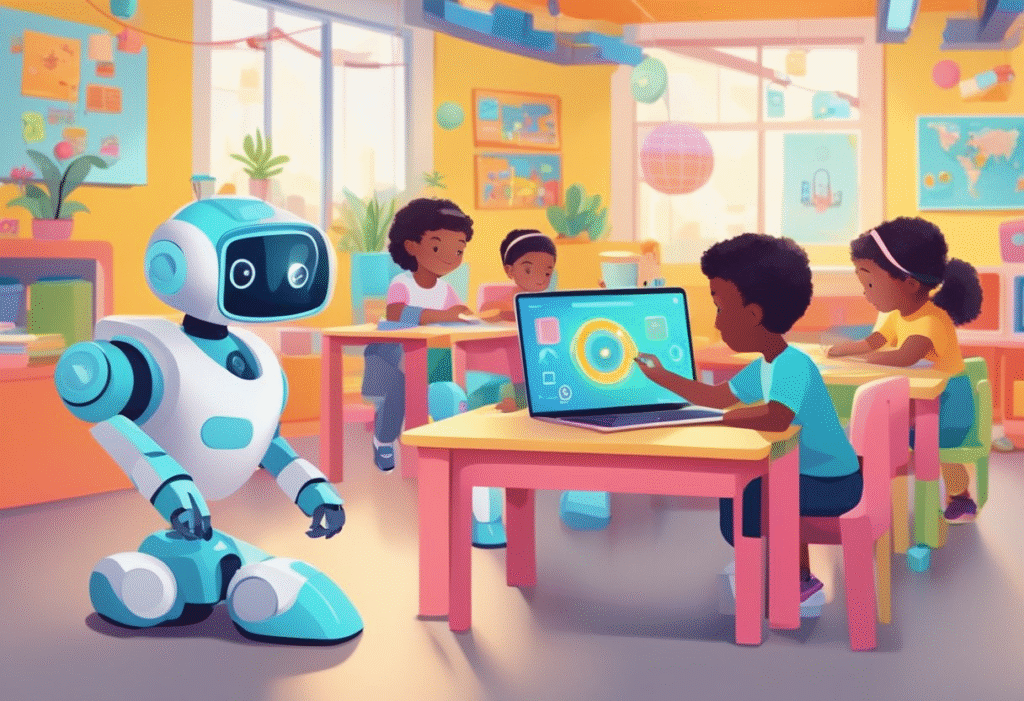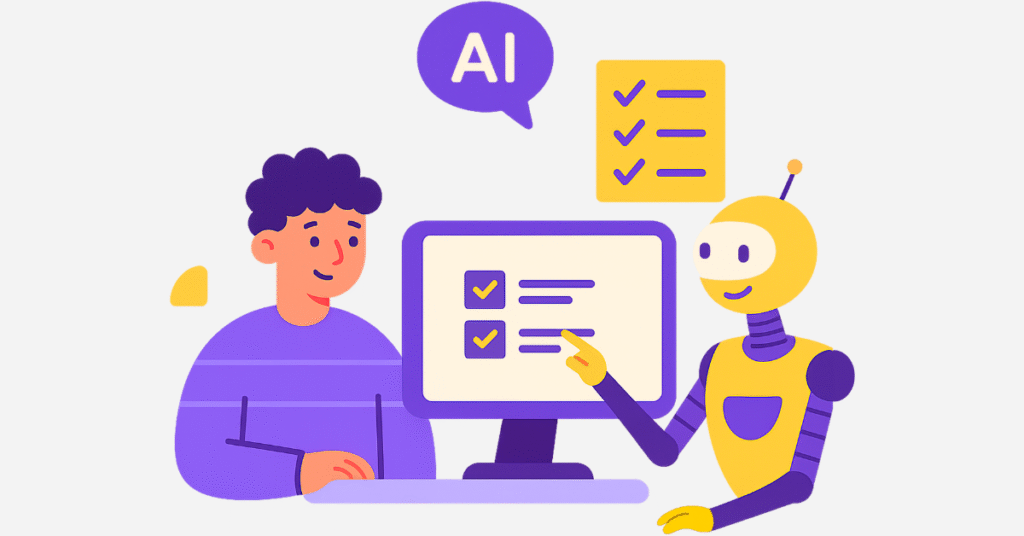
AI education has emerged as a fundamental necessity for preparing the next generation for an increasingly digital future. With artificial intelligence transforming every industry and aspect of daily life, equipping children and young people with AI skills isn’t just beneficial—it’s essential for their creative and educational development.
The Growing Imperative for AI Literacy
The statistics paint a compelling picture: according to the World Economic Forum, 97 million new AI-powered roles will emerge globally by 2025, while 54% of global educators and 76% of education leaders view AI literacy as essential for every student. This isn’t merely about preparing students for tech careers; AI literacy has become a core competency that enhances learning across all disciplines.
AI literacy encompasses four key domains that empower young learners:
- Engaging with AI: Understanding when and how AI is present in everyday tools and critically evaluating its outputs
- Creating with AI: Collaborating with AI tools to support problem-solving and creativity while considering ethical implications
- Managing AI’s actions: Delegating tasks to AI responsibly with proper human oversight
- Designing AI solutions: Exploring how AI works and adapting systems to solve real-world problems
Transformative Benefits for Creative Education
Enhanced Personalized Learning
AI fundamentally transforms the educational experience by providing personalized content and feedback tailored to each student’s learning style, pace, and interests. Data visualization apps can convert complex information into attractive, meaningful visualizations that help students grasp difficult concepts more quickly. This personalization enables students to explore subjects in creative ways that align with their individual strengths and curiosities.
Boosting Creative Expression and Problem-Solving

Research demonstrates that AI usage in teaching significantly enhances students’ creativity, with learning engagement playing a crucial mediating role. Students can use AI tools to:
- Generate innovative solutions to complex problems through brainstorming and ideation support
- Create original artwork, music, and stories using AI-powered creative platforms
- Develop interdisciplinary approaches by applying AI across different subject areas
- Express unique perspectives through personalized projects that showcase individual creativity
Developing Critical Thinking and Digital Citizenship
AI education goes beyond technical skills to foster critical thinking about technology’s role in society. Students learn to evaluate AI outputs, understand algorithmic bias, and consider ethical implications of AI systems. This creates more mindful digital citizens who can question and assess AI technologies responsibly.
The integration of AI literacy with digital citizenship education helps students understand:
- Privacy and data protection when interacting with AI systems
- Ethical considerations around AI use in different contexts
- Media literacy to distinguish between human-created and AI-generated content
Age-Appropriate AI Tools and Platforms
Elementary School (Ages 6-12)
Scratch with AI Extensions serves as an ideal entry point, using visual block-based coding to introduce AI concepts through interactive projects. Children can create emotion-detection programs, simple chatbots, and image classification games without requiring advanced programming knowledge.
Google’s Teachable Machine allows young learners to train their own machine learning models using images, sounds, or poses, making abstract AI concepts tangible and engaging.
Creative AI Tools like Toontastic 3D and KidGenie enable storytelling and animation creation, fostering narrative skills while introducing AI assistance in the creative process.
Middle and High School (Ages 13-18)
Advanced Creative Platforms such as AI Dungeon for interactive storytelling and Boomy for music creation provide more sophisticated creative outlets.
Programming Integration through platforms like MIT’s App Inventor with AI extensions enables students to build functional mobile applications incorporating machine learning.
Real-World Applications allow students to tackle genuine problems through AI-powered solutions, from environmental monitoring to accessibility tools.
Preparing Students for Future Careers

The future workforce will demand professionals who can effectively collaborate with AI systems across all industries. Students who develop AI literacy early will be better positioned for careers in:
- Creative Industries: Using AI for content generation, design assistance, and artistic exploration
- Healthcare: Leveraging AI for diagnostics, treatment planning, and patient care
- Education: Implementing personalized learning technologies and adaptive assessment systems
- Business and Entrepreneurship: Building AI-enhanced products and services
- Research and Innovation: Applying AI to solve complex global challenges
Importantly, AI education emphasizes human skills that complement technology: creativity, emotional intelligence, ethical reasoning, and collaborative problem-solving. These capabilities remain uniquely human and become more valuable as AI handles routine tasks.
Building Creative Confidence and Agency
One of the most significant benefits of AI education is how it removes barriers to creative expression. Students without advanced technical or artistic skills can use AI tools to bring their imaginative ideas to life. This democratization of creativity builds confidence and encourages students to see themselves as creators and innovators rather than passive consumers of technology.
Research shows that when students actively negotiate AI use—adapting or rejecting AI suggestions to maintain creative control—they demonstrate strong agency and deeper learning. This active engagement with AI tools fosters creative self-efficacy and prepares students to be thoughtful leaders in an AI-enhanced world.
Implementation Strategies for Educators

Start with Hands-On Projects
Begin with simple, engaging projects that demonstrate AI capabilities in relatable contexts. Examples include creating AI-powered recycling sorters, emotion-detection games, or personalized learning assistants.
Emphasize Ethical Considerations
Integrate discussions about AI ethics, bias, and responsible use throughout all activities. Help students understand the societal implications of AI technologies.
Foster Collaborative Learning
Encourage group projects that combine human creativity with AI assistance, teaching students how to work effectively in human-AI teams.
Provide Diverse Applications
Show AI applications across multiple disciplines—from art and music to science and social studies—to help students understand AI’s broad relevance.
The Path Forward
AI skills education represents far more than technological literacy; it’s about empowering young people to be creative, ethical, and thoughtful participants in an AI-driven society. By introducing AI concepts through engaging, hands-on activities that emphasize creativity and critical thinking, we prepare students not just to use AI tools, but to shape how these technologies develop and serve humanity.
The goal isn’t to create a generation dependent on AI, but rather young people who can harness AI’s capabilities while maintaining their uniquely human qualities of creativity, empathy, and moral reasoning. This balanced approach ensures that as AI continues to transform our world, it does so in ways that amplify human potential rather than diminish it.
Through thoughtful integration of AI skills into creative education, we’re not just teaching students about technology—we’re empowering them to become the innovative leaders, ethical decision-makers, and creative problem-solvers our future desperately needs.
- https://www.weforum.org/stories/2025/05/why-ai-literacy-is-now-a-core-competency-in-education/
- https://cdn-dynmedia-1.microsoft.com/is/content/microsoftcorp/microsoft/bade/documents/products-and-services/en-us/education/2025-Microsoft-AI-in-Education-Report.pdf
- https://www.jetlearn.com/blog/future-careers-that-will-use-ai-and-how-your-child-can-prepare-now
- https://www.kidocode.com/blog/5-benefits-of-ai-and-robotics-for-kids
- https://pmc.ncbi.nlm.nih.gov/articles/PMC12109026/
- https://dev.to/growkon21/benefits-of-ai-in-enhancing-student-creativity-4mb
- https://www.qualtrics.com/blog/ai-art-for-kids/
- https://www.jetlearn.com/blog/9-best-generative-ai-tools-for-kids-safe-fun
- https://blog.adobe.com/en/publish/2023/10/17/how-drive-student-success-with-creative-generative-ai-tools-classroom
- https://www.ecoleglobale.com/blog/responsible-ai-for-youth-empowering/
- https://sis.edu.in/nurturing-digital-citizenship-skills-in-an-ai-age/
- https://skoolofcode.us/blog/ai-ethics-for-kids-your-digital-playground-guide/
- https://iste.org/blog/simple-starters-for-ai-literacy-and-digital-citizenship-learning
- https://www.codingal.com/coding-for-kids/blog/teach-kids-ai-codng-concepts-creatively-using-scratch/
- https://www.codingal.com/coding-for-kids/blog/free-ai-tools-for-kids-teens/
- https://www.jetlearn.com/blog/10-best-ai-tools-for-kids-in-2025-fun-safe-educational
- https://www.linkedin.com/pulse/preparing-future-what-my-kids-should-study-age-ai-dan-daugherty-ws8jc
- https://www.edweek.org/sponsor/adobe-corporation/the-top-5-ways-generative-ai-increases-student-creativity
- https://arxiv.org/abs/2505.03867
- https://www.eklavvya.com/blog/ai-edtech-tools/
- https://www.holoniq.com/notes/2025-education-trends-snapshot-ai-skills-and-workforce-pathways
- https://www.eschoolnews.com/digital-learning/2025/04/17/5-ai-tools-for-classroom-creativity/
- https://www.byitc.org/10-reasons-why-artificial-intelligence-education-is-essential-for-every-child/
- https://codakid.com/blog/why-ai-education-is-crucial-for-kids-in-2025/
- https://www.podareducation.org/blog-the-benefits-and-risks-of-using-ai-in-kids-learning
- https://www.edutopia.org/article/7-ai-tools-that-help-teachers-work-more-efficiently/
- https://research.aimultiple.com/generative-ai-in-education/
- https://skoolofcode.us/blog/why-should-every-child-learn-artificial-intelligence/
- https://slidesgo.com/ai
- https://education.illinois.edu/about/news-events/news/article/2024/10/24/ai-in-schools–pros-and-cons
- https://www.intellum.com/resources/blog/16-ai-tools-for-education-content-creation
- https://www.ed.gov/sites/ed/files/documents/ai-report/ai-report.pdf
- https://www.cpgoenkainternationalschool.com/blog/benefits-and-risks-of-using-artificial-intelligence-in-kids-learning
- https://grow.google/ai-for-educators/
- https://www.gse.harvard.edu/ideas/edcast/24/10/impact-ai-childrens-development
- https://www.patrickbiggin.com/blog/tiny-tunes-big-dreams
- https://www.sirtbhopal.ac.in/blogs/how-ai-tools-are-transforming-education-boosting-creativity-productivity-in-teaching
- https://www.aacsb.edu/insights/articles/2025/02/ai-and-creativity-a-pedagogy-of-wonder
- https://www.aitoolsforkids.com/p/best-ai-tools-for-kids-2025
- https://www.ucanwest.ca/blog/education-careers-tips/advantages-and-disadvantages-of-ai-in-education
- https://www.sciencedirect.com/science/article/pii/S2713374524000050
- https://pinecone.academy/blog/10-fun-and-educational-ai-activities-to-do-with-your-kids-this-summer
- https://sph.edu/blogs/benefits-of-ai-in-education/
- https://iste.org/blog/why-students-should-create-with-ai-tools
- https://amplyfi.com/blog/how-ai-is-reshaping-art-music-and-brand-storytelling/
- https://onlinedegrees.sandiego.edu/artificial-intelligence-education/
- https://www.youtube.com/watch?v=uzrvd-U3oc8
- https://bestcolleges.indiatoday.in/news-detail/ai-literacy-in-higher-education-preparing-students-for-the-future-workforce
- http://ejournal.ppsdp.org/index.php/pijed/article/view/152
- https://www.ellucian.com/blog/empower-graduates-workforce-ai-literacy-and-ethics
- https://scotlandfutureforum.org/wp-content/uploads/2023/07/20230606-Artificial-Intelligence-and-Education-Event-Report.pdf
- https://onlinedegrees.sandiego.edu/artificial-intelligence-jobs/
- https://www.digitaleducationcouncil.com/post/developing-ai-literacy-and-skills-how-can-institutions-do-it
- https://www.oecd.org/en/topics/sub-issues/artificial-intelligence-and-education-and-skills.html
- https://futurense.com/uni-blog/ai-skills-in-demand
- https://www.aiacceleratorinstitute.com/ai-literacy-essential-for-todays-workforce-and-businesses/
- https://www.panoramaed.com/blog/comprehensive-guide-21st-century-skills
- https://schoolai.com/blog/preparing-students-ai-workforce-critical-digital-soft-skills
- https://www.sciencedirect.com/science/article/abs/pii/S2772766125000394
- https://www.weforum.org/stories/2025/01/future-of-jobs-report-2025-jobs-of-the-future-and-the-skills-you-need-to-get-them/
- https://www.lexisnexis.com/community/insights/professional/b/industry-insights/posts/prepare-students-for-workforce-in-age-of-rapidly-evolving-ai
- https://www.coursera.org/in/articles/artificial-intelligence-jobs
- https://www.youtube.com/watch?v=Vd2jOt0qnEk
- https://www.tekplay.org/post/ai-education-and-problem-solving-skills-building-tomorrow-s-innovators
- https://codakid.com/scratch-programming/
- https://jprpk.com/index.php/jpr/article/view/602
- https://www.designsociety.org/download-publication/47319/THE+CHALLENGES+OF+TEACHING+CREATIVITY+USING+ARTIFICIAL+INTELLIGENCE
- https://www.tinkercoders.com/scratch-programming-the-fun-first-step-into-tech-for-your-kid/
- https://www.edsurge.com/news/2024-09-18-how-ai-can-foster-creative-thinking-in-the-classroom-and-beyond
- https://www.unioncatholic.org/resources/embracing-ai-in-the-classroom-enhancing-critical-thinking-problem-solving-and-creativity
- https://scratch.mit.edu/about
- https://internationalcurriculum.com/news/digital-citizenship-how-to-recognize-and-harness-the-potential-of-artificial-intelligence-ai
- https://www.upskillist.com/blog/7-ways-ai-boosts-creative-problem-solving/
- https://scratch.mit.edu
- https://raisingchildren.net.au/pre-teens/entertainment-technology/digital-life/digital-citizenship
